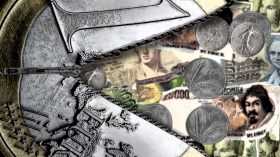
Source: Composite by G_marius based on a Vladimir Yaitskiy's image
Tax avoidance and tax evasion are big problems and are blamed for aggravating the financial crisis. Should there be more restrictions with offshore centers and tax haven countries? Vote and tell us why (below)
Tax haven definition
The Panama Leak scandal has brought back to the center of the public debate the problem of tax havens and offshore centers. Tax havens are used by multinational companies, powerful financial institutions, very wealthy individuals and transnational criminal organizations to avoid regulation, evade taxes, and reduce tax liabilities through transfer pricing, and to launder money.
According to the OECD, three key factors or criteria must be investigated in order to consider a jurisdiction as a tax haven:
- If there is a lack of transparency. Transparency is necessary to ensure fairness and that the authorities can assess properly tax liabilities.
- If there are laws or administrative procedures obstructing the necessary exchange of information, for tax purposes, with other governments on taxpayers. Bilateral exchanges of information about taxpayers are necessary and also serve to implement safeguards conducive to protect taxpayers' rights.
- If there is an absence of a requirement that the activity be substantial. This criterion was included in 1998 to indentify jurisdictions that are attempting to attract purely tax driven transactions and investments.
List of tax havens
According to Tax Justice Network, a Financial Secrecy Index (FSI) can be calculated for each country. The higher the value in the index, the larger influence on world economy in terms of economical secrecy or tax avoidance. The top 10 tax havens ranked by FSI (data 2015):
- Switzerland (FSI 1765,2)
- Luxembourg (FSI 1454,4)
- Hong Kong (FSI 1283,4)
- Cayman Islands (FSI 1233,5)
- Singapore (FSI 1216,8)
- United States (Mainland) (FSI 1212,9)
- Lebanon (FSI 747,8)
- Germany (FSI 738,3)
- Jersey (FSI 591,2)
- Japan (FSI 513,1)
It may be a surprise to find big economies such as the USA in the top 10, but some areas of these countries can be considered as tax havens (for example Delaware).
The European Commision is highly concerned with tax evasion. As as part of its campaign against multinational companies trying to dodge taxes, it has defined a black list of tax havens (countries and territories). The European Commission is trying to persuade these jurisdictions to adopt international standards and protocols for knowledge exchange and transparency. The blacklisted tax havens by the European Union in 2015 were: Andorra, Liechtenstein, Guernsey, Monaco, Mauritius, Liberia, Seychelles, Brunei, Hong Kong, Maldives, Cook Islands, Nauru, Niue, Marshall Islands, Vanuatu, Anguilla, Antigua and Barbuda, Bahamas, Barbados, Belize, Bermuda, British Virgin Islands, Cayman Islands, Grenada, Montserrat, Panama, St Vincent and the Grenadines, St Kitts and Nevis, Turks and Caicos and US Virgin Islands.
What is an offshore center?
An offshore center, or offshore financial center (OFC) is a low tax jurisdiction which is usually specialized in providing commercial and corporate services to non-resident individuals or offshore companies. Usually the scale of these services provided is incommensurate with the size the OFC's domestic economy.
Difference between a tax haven and an OFC
Some experts equate offshore centers and tax havens and claim that OFC is the politically correct way of referring to tax havens. However, historically the two concepts were different. There are tax havens since the beginning of the twentieth century, while offshore financial centers have existed for only about four decades. The latter were basically used as financial markets were non-residents could lend money to other non-residents free from taxes and regulatory restrictions. The designation of OFCs is commonly used when one is referring to the Eurodollar market or the wholesale international financial market.
Some offshore financial centers may not have statutory banking secrecy and have often adopted tax exchange standards and protocols to allow other countries to investigate and fight tax evasion.
Offshore structures, including offshore companies, partnerships, trust and private foundations, are created for a variety of reasons such as asset holding vehicles, avoidance of heirship provisions, collective investment (mutual funds, hedge funds, SICAVs) and other financial vehicles (exchange control, joint venture, stock market listing), trading of securities and derivatives, as well as for highly questionable purposes such as market manipulation, creditor avoidance and tax evasion.
List of offshore centers
According to the International Monetary Fund this is th list of OFCs:
- Andorra
- Anguilla (United Kingdom)
- Aruba (Netherlands)
- Bahamas
- Belize
- Bermuda
- British Virgin Islands (UK)
- Cayman Islands
- Cook Islands
- Cyprus
- Gibraltar (UK)
- Guernsey (UK)
- Isle of Man (UK)
- Jersey (UK)
- Liechtenstein
- Macao (China)
- Malaysia
- Monserrat (UK)
- Netherlands Antilles (Netherlands)
- Palau
- Panama
- Samoa
- Seychelles
- Turks and Caicos Islands
- Vanuatu
Should transactions with tax havens and offshore centers be restricted?
In a global economy, some countries use very low tax rates and the secrecy of the banking sector to attract economic activity, an option for local economic development among others like tourism or industry. They expect that some companies and individuals will invest their money in local banks and services to avoid tax in their country of origin. They offer very important tax exemptions.
Governments of these tax havens and offshore centers argue that tax regulation and bank secrecy are expressions of freedom and are coherent with the logic of capitalism. Those often small countries use this tax difference as a comparative advantage to compete with big economies.
On the other hand, these practices facilitate tax evasion and money laundering. In addition, many observers criticize that using an offshore centre is only possible for big companies and wealthy individuals, because of the legal costs, and therefore small companies and middle class citizens are the only one to pay full taxes in their country of origin. If more and more big companies avoid tax, there is less budget for public services, especially in times of economic crisis. Tax avoidance has become an important problems of our capitalist societies.
What do you think? Are tax havens economic dynamizers for the global economy or pernicious for other countries?
If you change your mind, you can change your vote simply by clicking on another option.
New to netivist?
Join with confidence, netivist is completely advertisement free. You will not receive any promotional materials from third parties.
Join the debate
In order to join the debate you must be logged in.
Already have an account on netivist? Just login. New to netivist? Create your account for free.
You are viewing a filtered list of comments. Click the button above to view all comments.
How Mighty Yuri saved me from Bankruptcy and recovered my lost cryptocurrency
My name is Albert, in the depths of financial despair, I found myself on the brink of bankruptcy. My life savings, consisting of a substantial amount of cryptocurrency worth $120,000, had mysteriously vanished into thin air. Every effort to recover it had proven futile, and I was left feeling helpless and devastated.
Amidst the darkness, a ray of hope shone through in the form of a renowned figure known as Mighty Yuri. His name echoed throughout online communities as a savior, a wizard in the realm of lost finances. Intrigued and desperate, I reached out to him, clinging to the last thread of optimism.
Mighty Yuri responded swiftly, exuding an air of confidence and expertise. He assured me that he had dedicated years to mastering the art of recovering lost funds and restoring financial stability. With nothing left to lose, I entrusted him with the daunting task of retrieving my cryptocurrency.
Doubt often threatened to consume me, but I reminded myself that I had taken a leap of faith and had to trust in his abilities. Finally, the day arrived when a message from Mighty Yuri illuminated my inbox. His words dripped with triumph, as he revealed that he had successfully tracked down and recovered my lost funds.
Overwhelmed with relief and gratitude, I couldn't believe my luck. Mighty Yuri had managed to salvage my financial future and pull me back from the abyss of bankruptcy. His perseverance, expertise, and unwavering dedication had proven to be the key that unlocked the treasure chest of my lost funds.
In the aftermath of this miraculous turnaround, I felt compelled to express my deep appreciation and share the tale of Mighty Yuri's extraordinary abilities. He had breathed life into my financial endeavors, rescuing me from the brink of ruin and allowing me to rebuild my dreams. It was a testament to the power of human ingenuity and the invaluable impact a single individual can have on another's life.
Though my encounter with Mighty Yuri had brought my financial woes to a triumphant end, I realized the importance of remaining cautious and vigilant in the world of cryptocurrencies. With newfound wisdom, I vowed to educate myself further, ensuring that I wouldn't fall victim to such misfortune again.
As for Mighty Yuri, he continued to be a beacon of hope for those in dire need of financial recovery. His legacy grew, as countless individuals turned to him for assistance in their darkest hours. His expertise transcended borders, reaching people from all walks of life who sought solace and redemption.
While my personal journey with Mighty Yuri may have concluded, his impact on my life would forever be etched in my memory. With a renewed sense of purpose and gratitude, I set forth on a new path, armed with the knowledge that even in the darkest of times, there are those who possess the power to restore light and lead us to brighter days.
Mighty Yuri can be contacted via email
Mightyyuri(@)consultant(.)com
WhatsAp: +1 (828) 630‑8408
Join the debate
In order to join the debate you must be logged in.
Already have an account on netivist? Just login. New to netivist? Create your account for free.



















